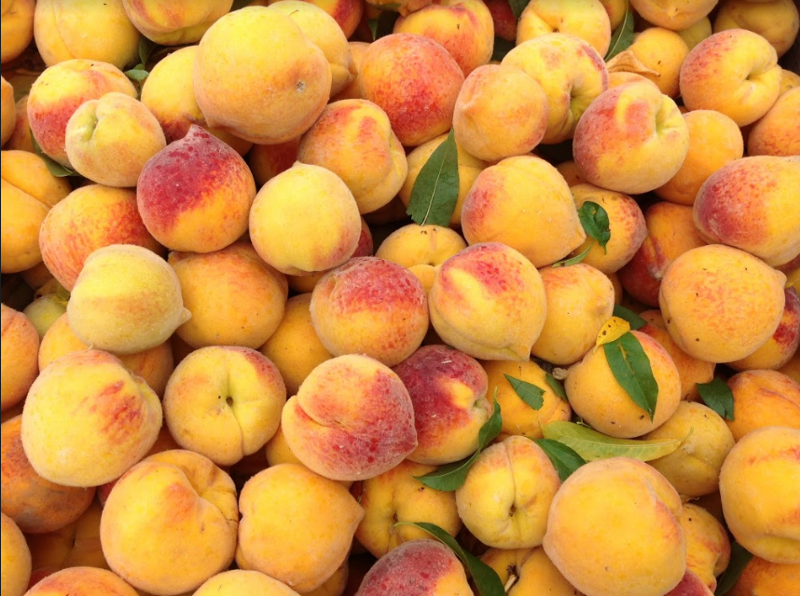Weigh GMOs With Facts, Not Fear
This post was originally published on GMO Answers' Medium Page.

According to the National Academies of Sciences, Engineering and Medicine, there is no evidence of adverse health effects attributed to genetically engineered crops. (Image Credit: GMO Answers)
Twitter. It’s a great way to communicate with friends and colleagues; share information; track your favorite music artists or author; and keep up on current issues, politics and trends. But, sometimes the information shared falls into what I would consider sensationalism or “Fake News” with “Alternative Facts.”
Recently, Twitter had a flurry of activity reacting to new product labeling for Girl Scout cookies that reads, “Produced with Genetic Engineering” under its list of ingredients. Reaction to this was mixed and mostly misunderstood.
As a mother, educator and a small-scale farmer of peaches, plums and grapes, I desire to have meaningful information about the food I am feeding my children, as well as worry about the safety of my children and future of food production — which makes me question a lot of things in life. Biotechnology, which includes genetic engineering or GMOs, certainly falls in that category.
However, I wholeheartedly support the use of biotechnology in the production of food, fiber, floral and fuel. For centuries, humankind has made improvements to plants through selective breeding and hybridization — the controlled pollination of plants. Plant biotechnology is an extension of traditional plant breeding with one very important difference — biotechnology ensures the transfer of beneficial traits in a precise, controlled manner.
Check out the really cute video, which can explain this much better than I: The Life of a Seed — Jake, a GMO seed.
I’m the type of person who doesn’t take things at face value. So, please know that I did not come to the conclusion of supporting genetic engineering (GE) just because I was swept up in some euphoria cloud of ignorance or based my “feelings” upon media sound bites. I like to research the issues, read what and when I can, and I like to ask questions of people who know more than me because I’m not a scientist. I want to know that the food I eat and prepare for my family is safe and nutritious. I also want to know what technological advances are occurring to keep my food safe and that those same advances include research to protect my family against disease and find cures for existing diseases.
What I have learned is that agricultural biotechnology or GE is probably the most intensively studied agricultural innovation of all time. Here’s what’s happening –
- Researchers of agricultural biotechnology are developing more convenient, healthier choices in grocery stores and tastier foods for the family dinner table. Very cool!
- Creating ways to boost the nutritional value of foods using agricultural biotechnology, biotech foods and crops are as safe as their non-biotech counterparts. Wow!
- Researchers look at the levels of macronutrients and micronutrients, as well as fats, sugars and proteins. Amazing!
- Every inserted gene is compared to over 1,950 genes to see if there is a match between the gene and known allergens. There has never been a biotech food product marketed that contained a protein similar to a known allergen. In my opinion, this probably makes biotech foods safer than all other new varieties of food crops that are not analyzed for potential allergens. Who knew?!?
- Further, scientists are working to develop biotech crops that may actually be more nutritious and healthy than conventional and organic crops, as well as working to develop allergy-free wheat, which will benefit up to seven million Americans who suffer from food allergies. So important!
Peer-reviewed scientific studies have concluded that there is no evidence that organically produced food is any safer than food produced by any other method of farming, nor is there a clear nutritional bonus to eating organic. Further, there is no evidence that genetically engineered foods currently on the market pose any human health concern or that they are any less safe than those foods produced through traditional breeding. “To date, no adverse health effects attributed to genetic engineering have been documented in the human population,” according to the National Academies of Sciences, Engineering and Medicine.
A photo from Karri Hammerstrom’s peach farm. *There are currently no commercially available GMO peaches. (Image Credit: Karri Hammerstrom)

Ingredients produced using biotechnology have been used for years, having been scientifically proven safe for consumption. Today, GM derivatives can be found in 70 to 80 percent of the processed food on U.S. supermarket shelves, as estimated by the Grocery Manufacturers of America. Biotech ingredients, which include soybeans, soy oil, soy lecithin, corn, corn syrup, canola oil, cottonseed oil, and papaya, can be found in items such as cookies, crackers, taco shells, soft drinks, and salad dressing.
Again, I am confident in the safety of GMOs. I believe the best way to keep my family safe and healthy is to make sure they eat a balanced diet and daily make good food choices. I am a #Moms4GMOs!
Who’s Providing Oversight for GE?
Crops developed through biotechnology are subject to testing and monitoring at three levels of the federal government, which secure food and environmental safety of biotechnology-derived products.
- U.S. Department of Agriculture’s Animal and Plant Health Inspection Service (USDA-APHIS) — they have jurisdiction over the planting of genetically engineered plants.
- U.S. Environmental Protection Agency (EPA) — they have jurisdiction over planting and food and feed uses of pesticides engineered into plants or used with GM plants.
- U.S. Department of Health and Human Services’ Food and Drug Administration (FDA) — they have jurisdiction over food and feed uses of all foods from plants.



